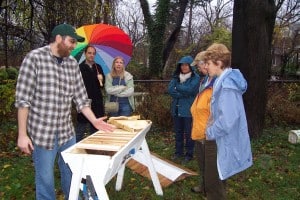Bringing the Community Together to Strengthen Sustainable and Regenerative Practices
A project of Hazon’s friends.
By Sarah Gabriel, Managing Director, The Home Grown Institute
March 24-25, in NW Philadelphia (Chestnut Hill)

Matt Feldman, Home Grown presenter, instructs students and planners of The Home Grown Institute in the building and maintenance of Kenyan Top Bar beehives.
We hear a lot about “sustainable” these days. What does it really mean? Well, it turns out that the human race has gotten itself into a little pickle… We’ve been using natural resources way faster than the Earth produces them and in a way that is bad for our health. We have to figure o ut how to put on the brakes and clean up the mess. When I talk about “sustainable practice,” I like to boil it down to two things – our relationship to consumption and waste and our resilience in the face of adversity, disappointment and change. Important stuff, but I have to admit that for me, “sustainable” has a little bit of a feeling of limping along.
“Regenerative practice” uses a slightly different lens… With regenerative practices there is an assumption that there is no such thing as waste – that what we call waste is just a resource looking for a use – and a belief that by working with nature instead of against it, we can actually make things better – improve life on the planet for humans and other species. That might look like using cover crops and even backyard chicken “waste” as a method of putting nitrogen back into the soil instead of force-feeding chemical fertilizer, which is made from petroleum products and actually depletes nutrients from the soil. In industry, it means thinking ahead – “cradle to cradle” – knowing in advance how we are going to use materials when a product has expired. Personally, it can mean adopting an eco-kashrut food consciousness and giving ourselves permission to slow down – to have a real Shabbat – in order to nourish our body and soul.
The mission of The Home Grown Institute is to energize the community – through skill-building and connection – to move forward on a more sustainable, regenerative path. The focus is on local food systems and watershed issues and what we can each do in our homes and daily routines. It is Community-Centered, Skills-Focused and Action-Driven.
Although The Home Grown Institute programs year-round, the March conference, “Springing Good Intentions into Action” is the flagship event. It is a community immersion experience where participants are encouraged to learn new skills and are moved into action in areas of their own choosing. Thirty-five years of research strongly suggests that there are three and a half significant factors that help people go from good intentions to action:
Intrinsic Motivation †You gotta wanna do it. Not because your mother said so, or the article in the New York Times said so, but because you really, deeply want it for yourself.
Access to Resources †It isn’t gonna happen unless the ways and means needed are available and the obstacles to access are removed. Time, money, valid and valuable information, the right “stuff”, geographic convenience, and a reasonable, doâ€able, plan of action.
Social Support †A companion, or buddy or even just a witness or someone you ask to hold you accountable.
The Half: If there is a Provider of a Service, a good relationship with that provider – e.g. if you like your teacher, you are more likely to do well in the class…
What we know is that if you get these three and half things in place, your likelihood of success – with any goal you set for yourself – skyrockets.
At The Home Grown Institute, the whole experience is designed around activating these three and half factors. Topics include beekeeping, backyard chickens, composting, rain harvesting, extending the growing season, pollinator gardening, upcycling and repurposing, permaculture, sustainability as a spiritual path and more. The “Tour, Learn & Build” workshops include a morning of visiting neighborhood sites where these backyard activities are working and afternoon of building coops and beehives and raised beds, etc. The Saturday evening reception will include fun food, community awards, story-sharing, seed exchange, tool swap, silent auction and resource center.
In addition to the more than 50 workshops for grown-ups, there is a robust program for kids and teens. Children will have the opportunity to participated in hands-on and active workshops lead by adults and teens working with Weavers Way Community Programs, Teens 4 Good, Green Woods Charter School, Wissahickon Charter School, and more! Whether exploring nature in the Wissahickon or learning how to construct useful things from trash, our kids will begin to understand how the earth’s many systems connect to one another and how humans can have a more positive impact.
Teens will have the opportunity to participate in three different tracts focused on expanding knowledge of sustainability and regenerativity through hands-on learning and community building. Teens can choose from lessons in living simply, resourcefulness, and innovation from a “deep green” builder and thinker, creative film-making, and cooking with fresh foods – ending with a teen chef style battle.
For more information about The Home Grown Institute which will be held March 24-25 in NW Philadelphia, please visit thehomegrowninstitute.org. To view the full program descriptions with presenters’ bios, go to issuu.com/thehomegrowninstitute. Work exchange is available to reduce conference fees. To get more involved, contact Sarah Gabriel, Managing Director, at sarah@thehomegrowninstitute.org.




No comments yet.